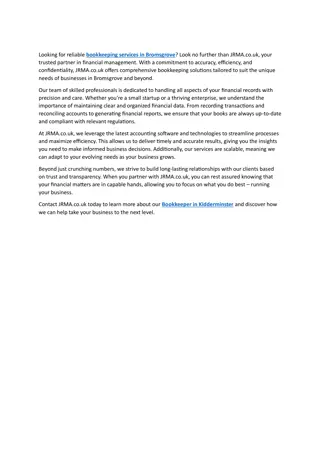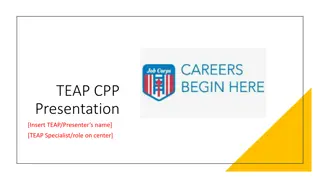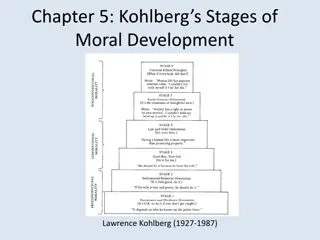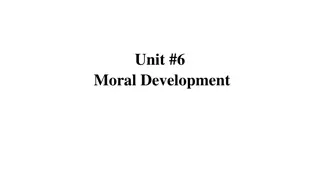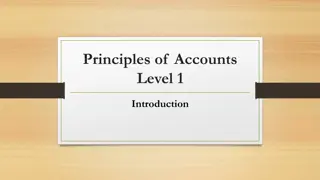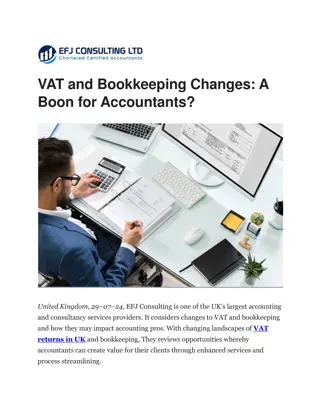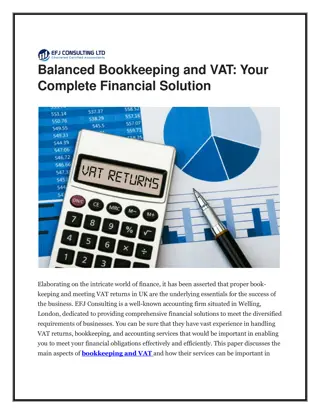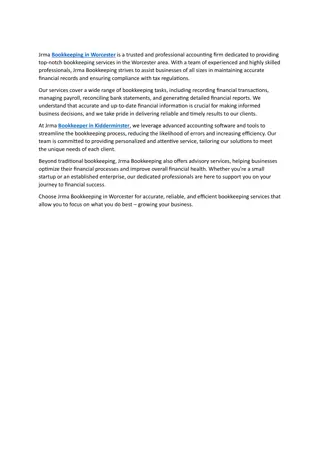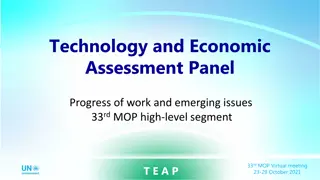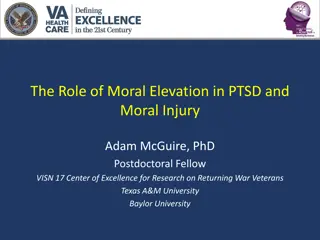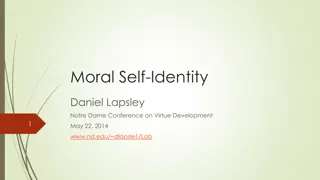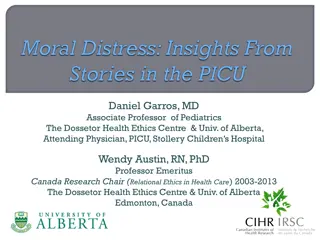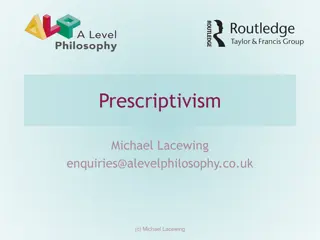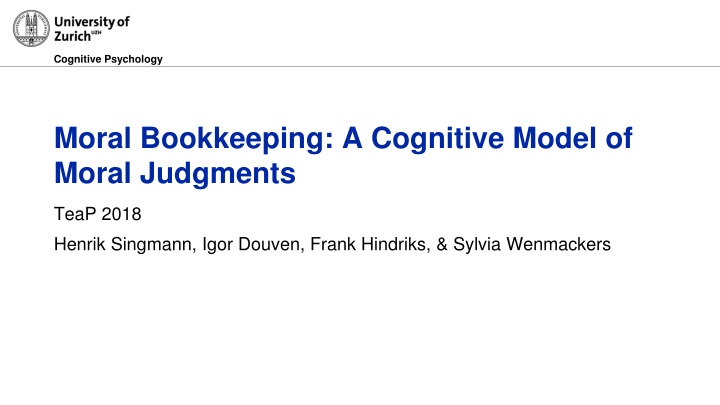
Model of Moral Judgments and Responsibility in Business Leadership
Explore the cognitive model of moral judgments in a business scenario where a chairman's actions impact the environment for profit gain. The study delves into the blameworthiness or praiseworthiness of the chairman based on his attitude towards harm or help to the environment.
Download Presentation

Please find below an Image/Link to download the presentation.
The content on the website is provided AS IS for your information and personal use only. It may not be sold, licensed, or shared on other websites without obtaining consent from the author. If you encounter any issues during the download, it is possible that the publisher has removed the file from their server.
You are allowed to download the files provided on this website for personal or commercial use, subject to the condition that they are used lawfully. All files are the property of their respective owners.
The content on the website is provided AS IS for your information and personal use only. It may not be sold, licensed, or shared on other websites without obtaining consent from the author.
E N D
Presentation Transcript
Cognitive Psychology Moral Bookkeeping: A Cognitive Model of Moral Judgments TeaP 2018 Henrik Singmann, Igor Douven, Frank Hindriks, & Sylvia Wenmackers
The vice-president of a company went to the chairman of the board and said, We are thinking of starting a new program. It will help us increase profits, but it will also harm the environment. The chairman of the board answered, I don t care at all about harming the environment. I just want to make as much profit as I can. Let s start the new program. They started the new program. Sure enough, the environment was harmed. How blameworthy is the chairman for acting as he did? +++ The vice-president of a company went to the chairman of the board and said, We are thinking of starting a new program. It will help us increase profits, but it will also help the environment. The chairman of the board answered, I don t care at all about helping the environment. I just want to make as much profit as I can. Let s start the new program. They started the new program. Sure enough, the environment was helped. How praiseworthy is the chairman for acting as he did? +
Moral Compositionality Hypothesis Divide and conquer strategy for moral judgments: Evaluation of action / outcome Evaluation of attitude / intention Moral bookkeeping: ? = ? + ? Outcome: Harm: outcome neutral (increased profit), side effect negative. Help: outcome neutral (increased profit), side effect positive. Attitude: Harm & Help: Indifference towards affecting environment; somewhat negative Moral responsibility: Harm: negative + somewhat negative = clearly negative Help: positive + somewhat negative = somewhat positive
Experimental Test: OA Version The vice-president of a company went to the chairman of the board and said, We are thinking of starting a new program. It will help us increase profits, but it will also harm the environment. The chairman of the board answered, I don t care at all about harming the environment. I just want to make as much profit as I can. Let s start the new program. They started the new program. Sure enough, the environment was harmed. How blameworthy or praiseworthy is the chairman for acting as he did? OA version: ? = ? + ?
Experimental Test: O version The vice-president of a company went to the chairman of the board and said, We are thinking of starting a new program. It will help us increase profits, but it will also harm the environment. The chairman of the board answered, I don t care at all about harming the environment. I just want to make as much profit as I can. Let s start the new program. They started the new program. As an effect of the program, the environment was harmed. How blameworthy or praiseworthy is the chairman for acting as he did? OA version: ? = ? + ? O version: ? = ?
Experimental Test: A Version The vice-president of a company went to the chairman of the board and said, We are thinking of starting a new program. It will help us increase profits, but it will also harm the environment. The vice-president mentioned to the chairman that the effects of the program on the environment are unknown. The chairman of the board answered, I don t care at all about harming the environment. I just want to make as much profit as I can. Let s start the new program. They started the new program. Sure enough, the environment was harmed. How blameworthy or praiseworthy is the chairman for acting as he did? OA version: ? = ? + ? O version: ? = ? A version: ? = ?
Experimental Design 5 conditions per vignettes: 251 participants (online): 1. OA- (harm) Each answered 3 questions: OA, O, and A 2. OA+ (help) One question per scenario 3. O+ Either OA+ and O+ or OA- and O- 4. O- 5. A 3 different vignettes: 1. chairman of company (original Knobe scenario) 2. mayor of city 3. president of country
Observed Data error bar: 1 SE
Bayesian Statistics Requires likelihood (i.e., no least squares). Information (uncertainty) regarding parameters expressed via (continuous) probability distributions. 1. Prior distributions capture ignorance before data is collected. 2. Prior distributions updated in light of data using Bayes' theorem. 3. Posterior distributions reflect new state of knowledge.
Bayesian Moral Bookkeeping Model 3 parameters per scenario: -(negative outcome) +(positive outcome) (indifference attitude) Response model via Beta-Regression: Moral Bookkeeping provides mean (e.g., ??? = ? + ?; ??= ?) Scaled responses follows -distributions with scenario-specific precision : ? = ?? ? = 1 ? ? Priors: ? ,?+,? Normal 0,5 ? Cauchy+(0,5) Evaluate via posterior predictive distribution. Ferrari & Cribari-Neto (2004)
Observed Data (in blue) & Model Posterior Predictions (in red) inner error bar: 80% CI; outer: 95% CI error bar: 1 SE
Summary Mens Rea Asymmetry: Praise requires an intention to bring about a good outcome, while blame does not require an intention to bring about a bad outcome. Moral compositionality hypothesis: Overall moral judgment is combination of moral evaluations of the components of an act (i.e., outcome, ?, and attitudes, ?). Moral bookkeeping model: ? = ? + ? Model adequately accounts for central tendency using -Regression response model. However, precision parameter rather wide, ? 1. Future directions: Extend model to better account for individual-differences in hierarchical manner. Apply model to vignettes with different attitudes and/or more components.
New scenarios The mayor of a small city has to decide whether or not to build a bridge over a nearby river. One of his advisors tells him that doing so will improve the flow of traffic in the city but will also negatively affect the wildlife around the city. The minister of infrastructure of an African country advises the president of the country to construct a big dam to improve the country s irrigation systems. The minister tells the president that the dam will adversely impact the irrigation systems in the neighboring countries. The mayor responds: I don t care about what will happen to the wildlife. I want to improve the flow of traffic. So, let s build the bridge. The president responds that he doesn t care about the other countries, and he orders that the dam be built. The bridge was built. As a result, the wildlife around the city was negatively affected. The dam is built, and the irrigation systems in the neighboring countries suffer as a result.







